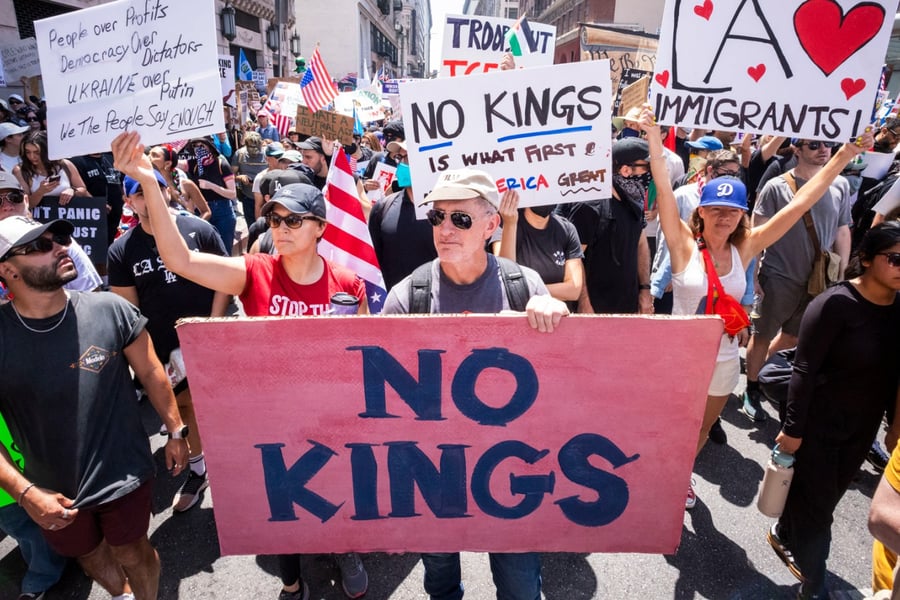The “No Kings” protests were historic. Millions of American activists turned out to protest President Donald Trump’s authoritarian impulses, on his birthday, Saturday, June 14, when the president threw himself a massively expensive, poorly attended military parade in Washington, D.C., replete with tanks and helicopters. (The parade was ostensibly also a celebration of the 250th anniversary of the Army.)
With more than 2,000 protests from big cities to small towns, in red states and blue states, No Kings created one of the largest mass demonstrations in modern memory. Organizers peg the turnout at 5 million. Independent observers say it could have been as high as 7 million. It was in any case millions more than the number of people who showed up for Trump’s sad, tin-pot spectacle.
No Kings organizers held a call Monday night to celebrate the achievement, as well as to announce the next steps for building a popular pro-democracy movement, including mass protests, leadership trainings, and consumer boycotts.
Those next steps include a new national protest, dubbed “Good Trouble Lives On.” That protest is scheduled for July 17, and honors one year since the passing of Civil Rights icon and Congressman John Lewis, who called on Americans fighting for justice to create “good trouble” in the name of redeeming the soul of America. The rallying cry for the march is “March in Peace. Act in Power.” The protest already has dozens of planned demonstrations.
The other action announced on the call is called “1 Million Rising.” Organized by Indivisible, the progressive grassroots juggernaut, the initiative seeks to harness the energy of protesters to build long-term political power. One Million Rising describes itself as “a national effort to train one million people” to become pro-democracy movement leaders, with “the skills to lead others.” The initiative aims to “build people power that can’t be ignored” and has as its mission statement: “1 Million Trained, Millions More Empowered.”
The consumer boycotts against Elon Musk and Tesla are also snowballing. The call featured the announcement of a Musk Must Fall protest, organized by Tesla Takedown activists on June 28, in honor of the birthday of the billionaire “broligarch,” who has departed from his destructive stint in the White House and has since publicly feuded with Trump. These protesters are now also targeting Musk’s business partners, including pressuring wireless giant T-Mobile to end its partnership with Musk’s satellite company, Starlink.
The Monday call was, by turns, jubilant and somber. The organizers celebrated the massive win of mobilizing millions to the streets. But they marked tragedies as well. These included the assassinations in Minnesota, which left the Democratic former state speaker and her husband dead. They also mourned gun violence at a No Kings protest in Utah, where a protester was shot and killed. (According to police and news reports, a 39-year-old fashion designer was killed by a stray bullet, fired by an armed protest security volunteer who was seeking to confront a man with an AR-15 assault rifle. That man has been charged with murder.)
Love Music?
Get your daily dose of everything happening in Australian/New Zealand music and globally.
The central message, though, was one of uplift — and determination to build on the momentum of Saturday’s happening to ensure that the energy of protest is channelled into movement-building. Ezra Levin, a cofounder of Indivisible said that millions of Americans needed to celebrate the achievement of turning out in defiance of Trump’s “ridiculous, authoritarian, theatrical, shambolic event.” He insisted Trump’s “authoritarian” parade “was worse than ridiculous. It was dangerous. This is the kind of thing you expect to see in North Korea and in China, not in the United States of America.” Levin said protesters had shown grace under pressure and trying circumstances adding: “I’m proud to be in this movement with y’all.”
Later in the call, an Indivisible colleague previewed the “1 Million Rising” initiative, aimed at building “power that lasts.” The organizer made clear that the initiative is the work of a coalition ranging from the League of Conservation Voters to the American Civil Liberties Union to the upstart grassroots group 50501. The point is not to have scores and scores of activists reinventing the wheel, but to give folks an opportunity to learn leadership skills and then “plug in” to organizations dedicated to the issues they are most passionate about, ranging from immigration and racial justice, to climate change, to voting rights and democracy building.
For the protest-minded, the next mass mobilization will channel the spirit of the late John Lewis, in a demonstration called Good Trouble Lives On. As previewed on the call by Barbara Arnwine of the Transformative Justice Coalition, organizers are launching a series of weekly “host trainings” (beginning tonight, June 18) for activist who want to plan demonstrations in their own city or town. Different from the April Hands Off and the June No Kings protests, this mobilization is explicitly about countering “attacks on our civil and human rights by the Trump administration.”
The call also featured a training from Maria Stephan of the The Horizons Project, who spoke about the impact of consumer boycotts in eroding support for Trump’s authoritarian project. Stephan highlighted the impact of protests against Elon Musk’s flagship company, Tesla, which she called “one of the most powerful consumer boycotts in recent memory,” causing Tesla shareholder value to plummet. “The company has become toxic.” She also highlighted the impact of the Black-led consumer boycott of Target, which seeks to punish the company for its retreat from diversity initiatives.
Stephan painted consumer activism as a powerful complement to street protest. The point, she insisted, is to change the incentives for powerful corporations, and their large shareholders (often including universities and pension funds). Success, she added, looks like “pulling them away from supporting authoritarian regimes, and towards supporting our pro-democracy movement.”
From Rolling Stone US



































